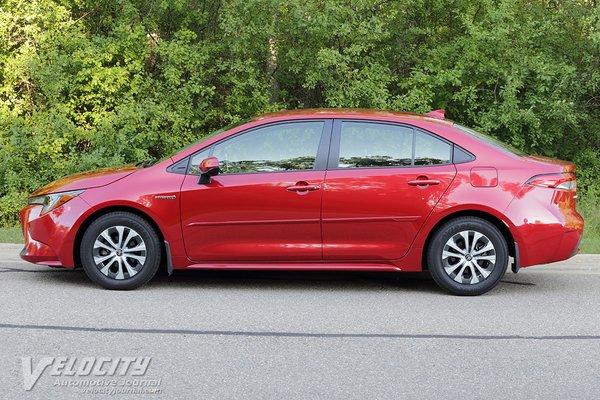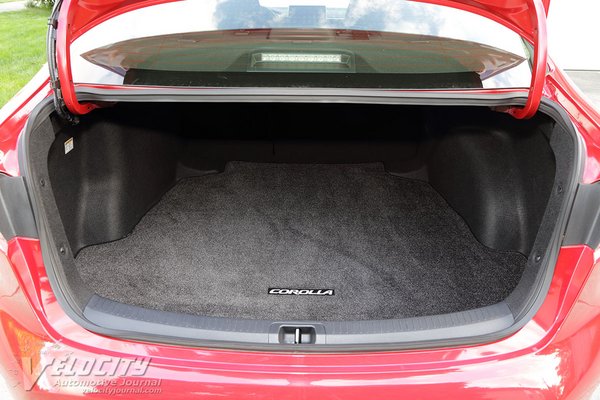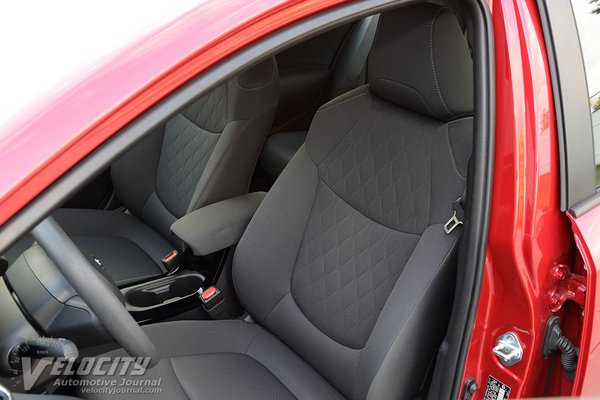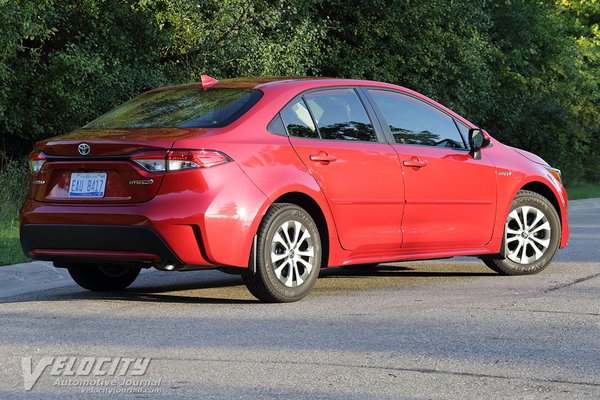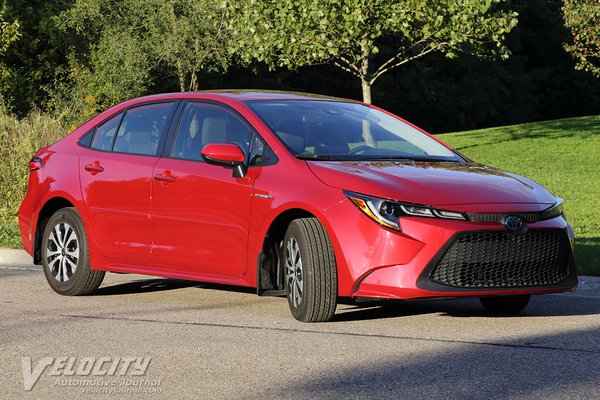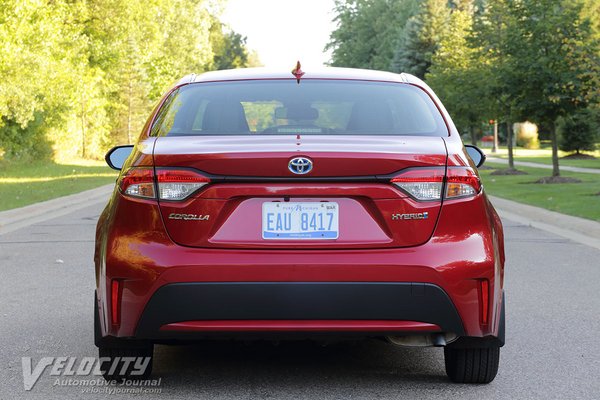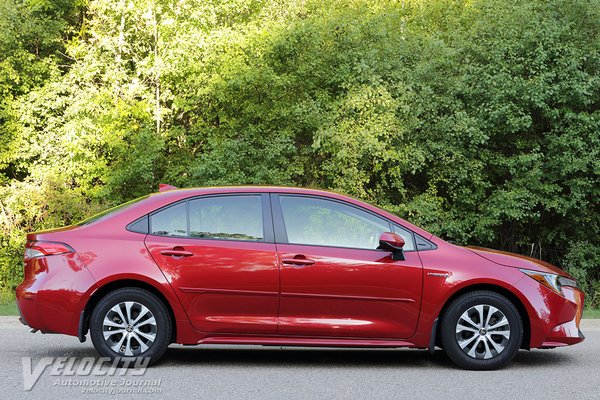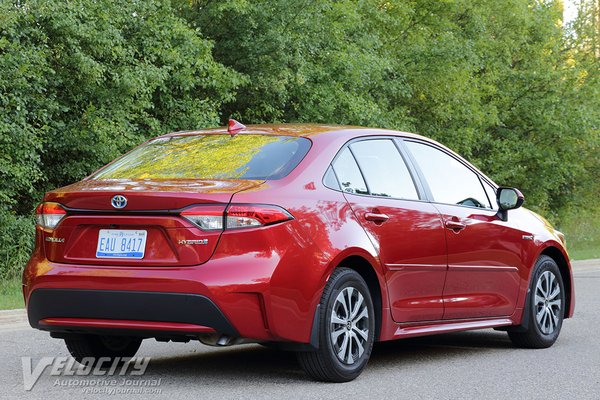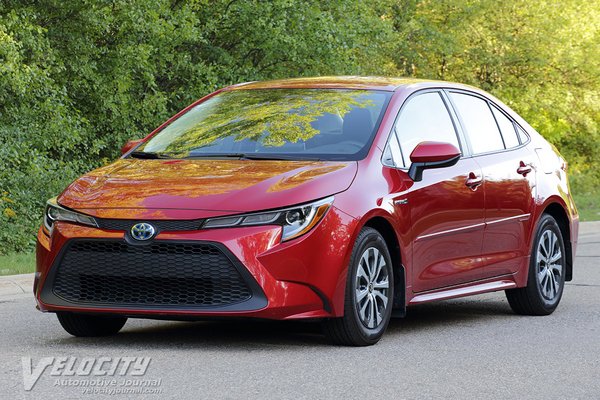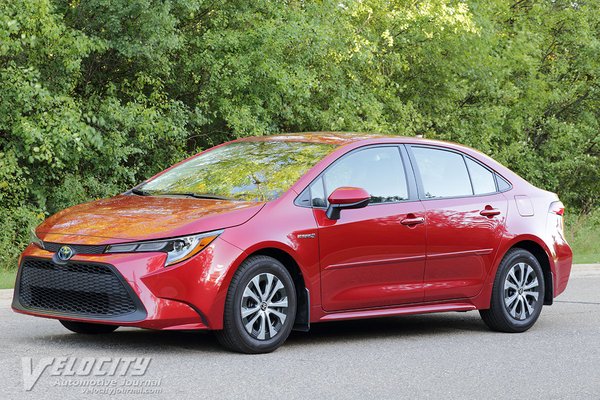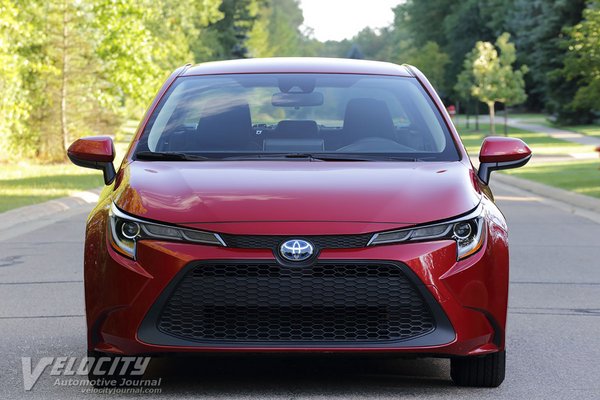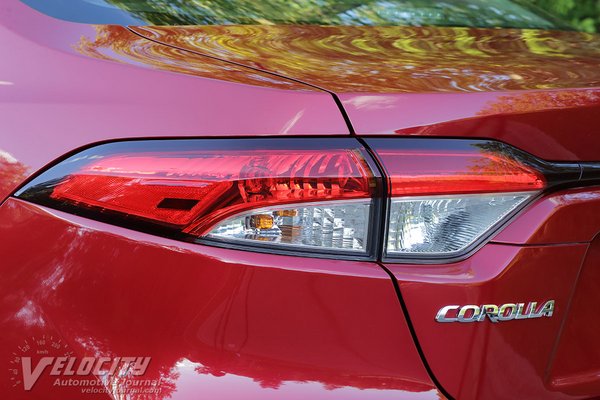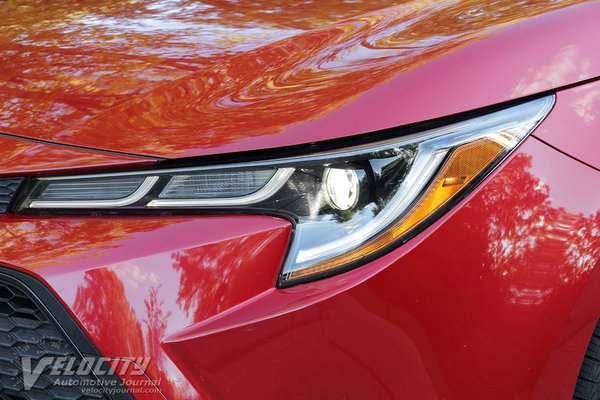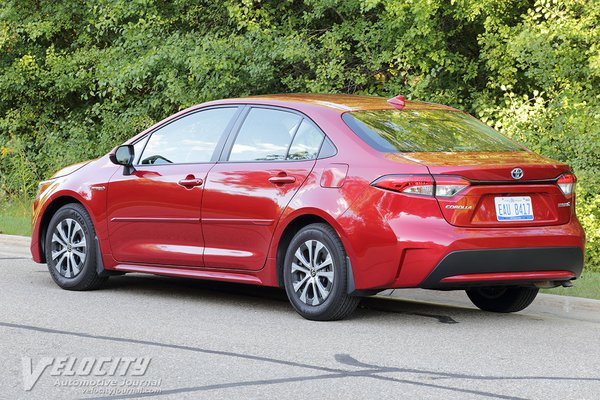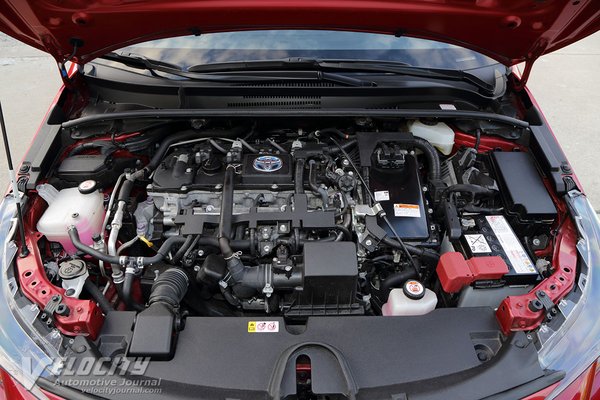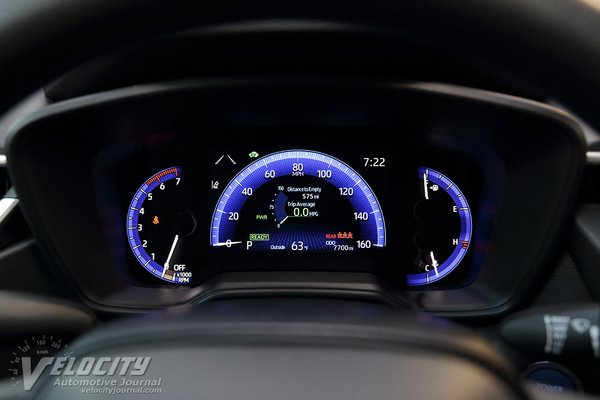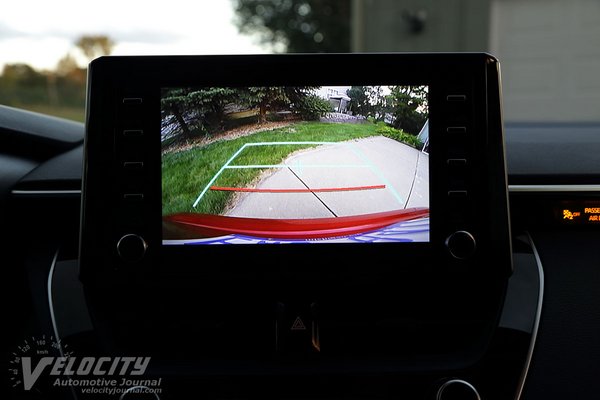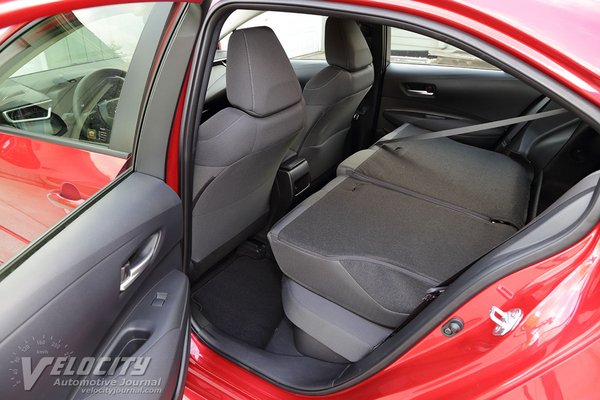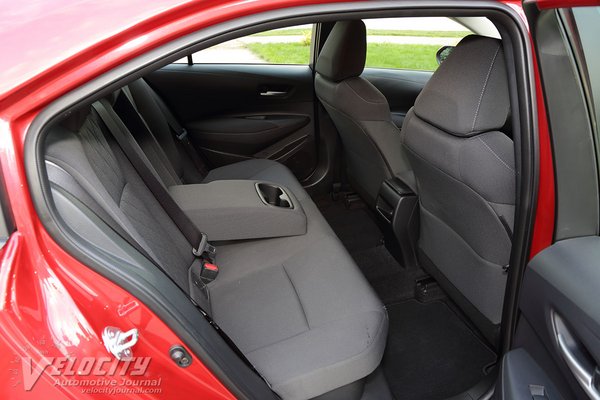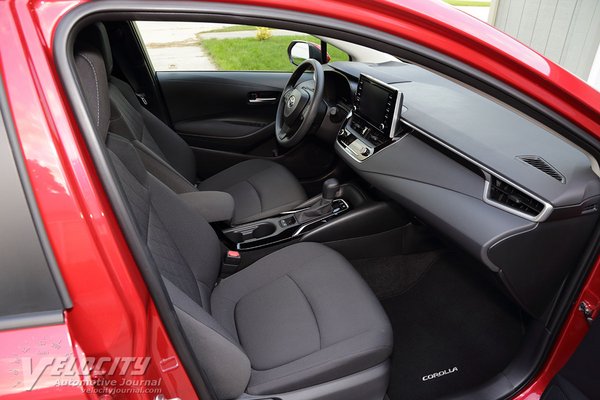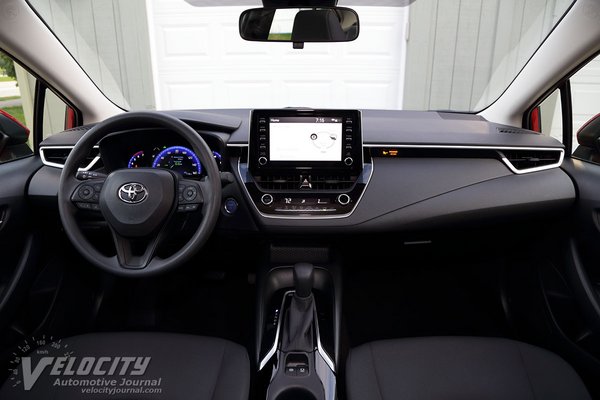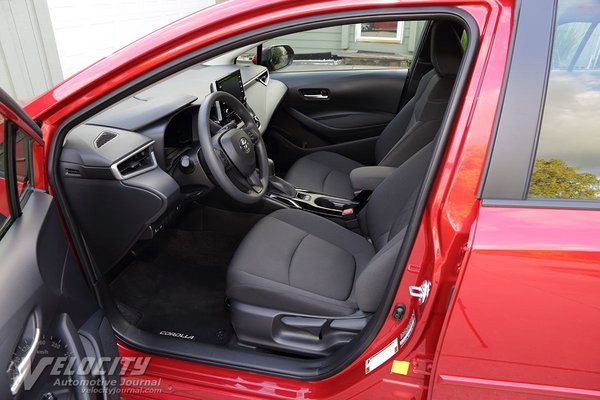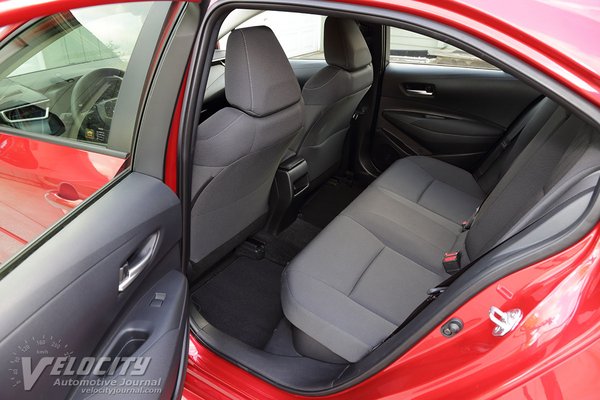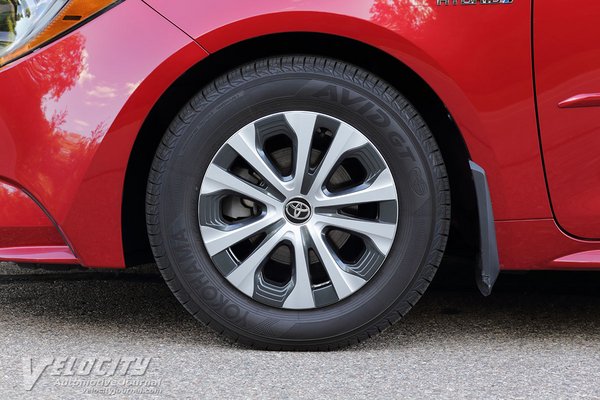2020 Toyota Corolla Hybrid LE
03/29/2021
Shahed Hussain
The compact sedan segment has shrunk as customers have steadily switched to compact SUVs. Undeterred by this trend in the US, Toyota added the 12th generation Corolla to the lineup in 2019. Toyota sells the new Corolla in three models: sedan, hybrid sedan and hatchback. Pricing starts at $19,600 for the 2020 Corolla L sedan and ranges up to $25,550 for the XSE CVTi-S. Note that 2021 base prices begin at $20,025 (Corolla L) and top out at $28,310 (XSE Apex Edition).
We tested the 2020 Corolla LE Hybrid sedan ($22,950) with a few options including body side moldings ($209), carpet mats ($249) and mudguards ($129). Adding in the $930 delivery fee totaled up to $24,467. Notable standard equipment includes LED headlights, 15-in. dia. alloy wheels, rearview camera, 6-way driver's seat, 7-in. infotainment display, 6-speaker audio system, and Apple CarPlay compatibility. Active safety technologies such as a pre-collision system, lane departure alert, lane tracing assist, dynamic radar cruise control and vehicle stability control are standard.
The Corolla Hybrid powertrain couples a 1.8L gas engine and a 53 kW (71 hp) synchronous AC motor. A 600V NiMH battery pack powers the electric motor. The fuel-injected dual overhead-cam inline-4 is tuned for 121-hp @ 5,200 RPM and maximum torque of 105 lb.-ft. @ 3,600 RPM. As with other Toyota engines, the 1.8L uses VVT-i (variable valve-timing with intelligence) for optimal efficiency. A CVTi (continuously variable transmission with intelligence) transmits power to the front wheels. The EPA estimated fuel consumption rating is 53/52 MPG (city/hwy.). In our testing we averaged 50-55 MPG on urban roads, and 45-47 MPG on the highway, so the EPA estimates seem reasonable if the driver obeys the 70 MPH highway speed limit.
In a departure from previous Corollas, and the general trend for compact cars, Toyota fitted a multi-link independent rear suspension with coil springs, dampers, and a stabilizer bar. The front suspension is a MacPherson strut design with a stabilizer bar. Brakes are all-disc with 10.8 in. dia. front rotors and 10.2 in. dia. rear rotors. The standard 15 in. dia. alloy wheels (capped with plastic wheel covers) mount P195/65R15 Yokohama AVID GT all-season tires. Steering is via an electrically-assisted rack-and-pinion system. Curb weight comes in at 3,050 lbs.
Toyota expended significant effort to upgrade the Corolla's interior materials. Most surfaces including the dashboard are covered in grained soft-touch plastics. Matte silver plastic trim accents door panels, steering wheel and dashboard, adding contrast to the gloss black trim on the dash and center console. A few cost cutting measures such as the hard plastic center console, and the molded plastic steering wheel rim are a reminder that the LE is just one grade up from the base Corolla L.
The Corolla's seats are covered in a bland gray fabric, unsurprising for the lower specification LE model. Both front seats are manually adjustable: 6-way for the driver and 4-way for the passenger. Front seat comfort was below par due to the firmly padded cushion. Lateral torso support is acceptable, but the flat seats are intended to accommodate larger physiques, so thigh support in lacking. Front headroom is adequate for up to 5'-11" occupants. The rear seats offer reasonable legroom, but headroom is tight for passengers taller than 5'-10" due to the low roofline. As in the front, the rear seats are not especially comfortable, but that is the norm in this class. A hard seatback makes the center rear position an unpleasant proposition for anything more than a short trip.
Toyota replaced the conventional dual round gauge cluster with a semi-circular LCD speedometer, flanked by an analog tachometer plus smaller fuel level and coolant temperature indicators. A multi-function display within the speedometer shows fuel consumption and other vehicle data. The steering wheel has integrated buttons for audio, cruise, phone, and vehicle systems status. A dash-mounted 7-in. touchscreen display enables access to audio functions and built-in apps. Navigation is an optional downloadable app, but was not installed in the test vehicle. Dual knobs and buttons on both sides of the display allow quick adjustments of frequently used functions. Climate controls settings are readily accessible below the center dash vents. A USB port and 12V outlet on the center console can charge portable electronic devices.
As expected, the Corolla's electric motor delivers instant torque for impressive low speed acceleration. Above 70 MPH, acceleration tapers off since the gas engine is the sole power source at higher speeds. The Corolla will cruise at 70-80 MPH, but passing other vehicles requires prior planning. Toyota engineers minimized the typical CVT droning, although at full throttle engine vibrations penetrate the cabin. Under most other driving conditions, engine noise is reasonably muted as the CVT programming aims to reduce RPM for maximum fuel efficiency. Of the three powertrain modes (Eco, Normal, and Power), we found the Power mode to be best for urban driving. From a stop, the Corolla glides away on electric power for the first few seconds until the gas engine starts up. Amazingly, the transition from electric to gasoline power is nearly imperceptible; the barely audible startup of the gas engine is the only clue that the Corolla is burning fuel. Moving the shift lever to the "B" mode engages the electric powertrain for 1-2 miles of nearly silent motoring at 15-20 MPH, if the battery is fully charged.
Building the Corolla on the flexible TNGA platform transforms ride and handling. Adopting the new independent rear suspension enabled the engineers the tune the chassis for a compliant ride without compromising body control. The suspension effectively deals with patched pavement and potholes, while isolating most road impacts from the passenger compartment. Stability and tracking at 80 MPH is exceptional for an affordable compact sedan. The Corolla turns-in with mild understeer and moderate body roll, typical for a front-drive compact sedan. Yokohama's Avid GT all-season tires deliver decent dry road grip, but are tuned for ride comfort. Steering is direct, with acceptable road feel and moderate power assist. The all-disc brakes provide good stopping power, with progressive actuation but slightly spongy pedal feel. Wind and tire noise are minimal at highway speeds, so the Corolla is a reasonable choice for a road trip.
Affordable hybrids have earned a deserved reputation for an unimpressive driving experience. The Corolla Hybrid is certainly no sport sedan but makes few compromises in return for its fuel efficiency. Toyota had to skimp on some interior amenities, but the Corolla is decently equipped considering its low sticker price. In an era of low fuel costs, a hybrid makes less financial sense to most customers, but long-distance commuters on a budget should consider the Corolla Hybrid.

